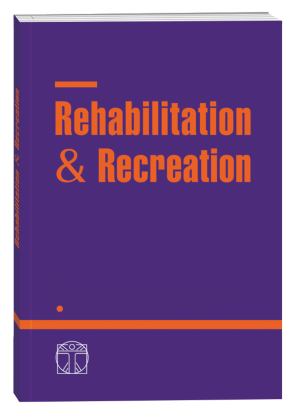STRUCTURAL-FUNCTIONAL MODEL FOR THE FORMATION OF SPORTS-ANALYTICAL SKILLS IN PHYSICAL CULTURE AND SPORTS SPECIALISTS
DOI:
https://doi.org/10.32782/2522-1795.2025.19.1.22Keywords:
sports analytics, professional training, competence, sports-analytical skills, information technologyAbstract
The purpose of this study is to present a structural-functional model for developing sports-analytical skills in physical culture and sports specialists during the study of the “Sports Analytics” discipline. Materials and methods. To achieve the research objective, a set of theoretical scientific research methods was applied, including analysis, synthesis, comparison, and generalization of scientific sources. This approach allowed for the identification of key aspects of the problem. The study was conducted in accordance with a methodological framework based on the principles of acmeological, axiological, qualitological, competency-based, personality-oriented, and systemic approaches to the formation of sports-analytical skills in physical culture and sports specialists. The information base of the study consisted of official sources from leading Ukrainian and European information resources. Results. The study identifies and justifies the key analytical skills changes necessary for future specialists in this field. It also outlines the general and professional competencies required for effective performance in the sports industry. The main directions of sports analytics are analyzed, including player and team performance evaluation, sports business, and athlete health analysis. The study determines the key competencies of sports analysts, which depend on their job responsibilities and roles within sports teams. A comprehensive approach was used to study the problems, including theoretical analysis, systematization of scientific sources, and empirical research methods. The proposed model consists of five main blocks: motivational-target, methodological, content-based, technological-process, and result-oriented. The article highlights the importance of integrating computer technologies and information modeling into the training process of future sports analysts. The approaches proposed in the study can be used in further scientific research aimed at improving the training of specialists in the field of sports analytics. Conclusions. The study demonstrated that the systematic development of professional competencies in future physical culture and sports specialists is based on the interiorization of the content of professionally oriented disciplines. This process involves acquiring specialized knowledge, gaining experience in independent professional activities based on this knowledge, and establishing the foundation for the successful application of acquired skills in professional practice.
References
1. Василюк В. М., Ярмощук О. О., Лук’янченко М. І. Детермінанти формування спортивно-аналітичних компетентностей фахівців галузі фізичної культури і спорту. Науковий часопис Національного педагогічного університету ім. М. П. Драгоманова. Серія № 15. Науково-педагогічні проблеми фізичної культури. Фізична культура і спорт. 2021. Вип. 6К (135) 21. С. 42–47.
2. Клопов Р. В. Сучасний стан готовності майбутніх фахівців з фізичного виховання та спорту до застосування інформаційних технологій у професійній діяльності. Педагогіка формування творчої особистості у вищій і загальноосвітній школах. 2013. Вип. 33. С. 567–573.
3. Павлюк Є. О. Аналіз професійного становлення майбутніх тренерів-викладачів у процесі фахової підготовки. Зб. наук. пр. Національної академії Державної прикордонної служби України. Серія: Педагогічні та психологічні науки. 2013. Вип. 4. С. 191–207.
4. Сватьєв А. В. Організація та зміст процесу підготовки майбутніх фахівців із фізичного виховання та спорту у вищих навчальних закладах України. Науковий вісник Мелітопольського державного педагогічного університету. Серія: Педагогіка. 2014. Вип. 1. С. 217–220.
5. Шинкарук О. А., Денисова Л. В., Харченко Л. А. Інформаційні технології як фактор освітніх перетворень в закладах вищої освіти з фізичної культури і спорту. Теорія і методика фізичного виховання і спорту. 2018. Вип. 1. С. 90–94.
6. Ярмощук О. О., Василюк В. М. Диверсифікація навчальних технологій в професійній підготовці учителя фізичної культури. Теорія та методика фізичного виховання. 2018. Вип. 2. С. 69–77.
7. Ярмощук О. О. Парадигма технологічних інновацій у сфері спорту. Природнича освіта та наука. Вип. 1. 2023. С. 32–37.
8. Cokins G., Walt DeGrange, Chambal St. and Walker R. Sports Analytics Taxonomy, V1.0, ORMS Today. 2016. http://viewer.zmags.com/publication/085442e2#/085442e2/42?platform=hootsuite.
9. Thuc D.C, Ngoc L.T.A. On the Method of Using Variance Analytical Skills in Sport-Pedagogical and Biomedical Research. Biosc. Biotech. Res. Comm. 2020. Vol. 13 (1).
10. Davenport T. Analytics in Sports – The New Science of Winning. Appears as a SASsponsored. 2014. http://www.sas.com/content/dam/SAS/en_us/doc/whitepaper2/iia-analyticsin-sports-106993.pdf.
11. Hughes, M., Franks, I.M. Notational Analysis of Sport: Systems for Better Coaching and Performance in Sport. Psychology Press, 2004.
12. Khantanapoka, K. and P. Nilsook. New concept of strategy instructional design in sport science education using statistic analysis together with game simulation. The 9th International Conference on Developing Real-Life Learning Experience: Innovation and Technology Education. https://www.researchgate.net/publication/216561251_New_Concept_of_Strategy_Instructional_Design_in_Sport_Science_Education_using_Statistic_Analysis_Together_with_Game_Simulation
Downloads
Published
How to Cite
Issue
Section
License

This work is licensed under a Creative Commons Attribution-NonCommercial-NoDerivatives 4.0 International License.





